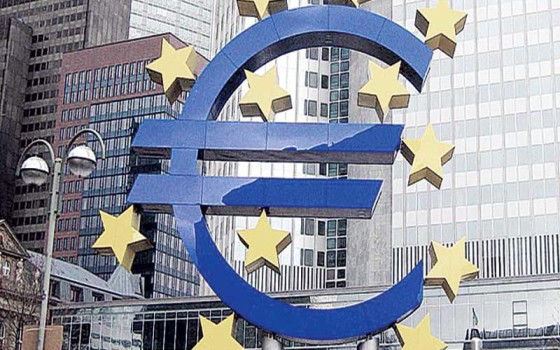
European Commission: Overall economic growth for the current year is higher than previously expected... Inflation has fallen and wages have risen, but there are risks that require decisive action... Progress on the digital euro file

- Europe and Arabs
- Friday , 19 September 2025 14:11 PM GMT
Brussels: Europe and the Arabs
The European Commission, through its Commissioner for Economic Affairs, Valdis Dombrovskis, in charge of economic issues, simplification, and production implementation, announced the latest developments on the economic outlook. He said at a closing press conference of the Eurogroup ministerial meetings in Copenhagen, the capital of the rotating Danish presidency of the EU, "I am pleased to be back in Copenhagen for these meetings, as we look to the future and prepare for an eventful end to the year. Let me start with the latest developments on the economic outlook.
Economic activity grew faster than expected in the first half of the year, particularly in the first quarter, with investment and exports exceeding expectations.
We expect growth for the year as a whole to be slightly higher than the 1.1% forecast for the EU in the spring.
At the same time, growth momentum is expected to slow, but not reverse, in the second half of the year.
This reflects several challenges, including slower global trade growth, persistent uncertainty, and geopolitical turmoil.
Hence, our growth forecast for next year is somewhat weaker than when we published it. Our spring forecast.
But, overall, the EU's economic fundamentals remain solid.
The labor market, in particular, remains strong.
We expect wages to rise and inflation to fall.
This is good news for households and is expected to continue supporting consumption.
However, there are multiple risks to the outlook, so we cannot afford to be complacent.
This underscores the need for decisive action to ensure our long-term prosperity and independence.
This brings me to my next point.
I warmly welcome the ambitious Eurogroup work program, as presented today by Eurogroup President Pascal Donohue, and I look forward to working with the ministers to implement it.
Let me briefly highlight three elements from the Commission's perspective.
First, fiscal and economic policy coordination.
Maintaining fiscal sustainability while ensuring adequate spending on key priorities, especially security and defense, will remain crucial going forward.
The Commission will assist Member States in making these difficult policy choices, including through the credible implementation of the new economic governance framework.
Second, in light of recent economic developments, it has become increasingly important to discuss ways to strengthen the role of the euro. As an international and digital currency.
I will return to today's discussion on the digital euro shortly.
But more broadly, we need to make progress on some long-standing work streams, such as the Savings and Investment Union and the Banking Union.
Finally, we need to work on strengthening Europe's competitiveness.
As you know, competitiveness is a key focus for the European Commission.
Guided by our Competitiveness Compass, we have already made progress in translating the recommendations of the Draghi Report into reality.
But more is needed, and we must work together to maximize impact.
In this regard, I once again welcome the focus the Eurogroup's work program places on this.
I now turn to the digital euro.
While we have seen slow but steady progress over the past two years, there is now an increasing urgency to reach political agreement and address the remaining outstanding issues.
Today, we had a discussion on this topic, and I am pleased to report that we have made significant progress in today's meeting. The Eurogroup, as Pascal mentioned, reached political agreement on the institutional framework for setting a ceiling. Retention limits, ensuring an appropriate role for both the Council and the European Central Bank.
This agreement gives new impetus to efforts to reach a common approach in the Council by the end of the year.
In this regard, I would like to thank the Danish Presidency for its commitment to moving forward on this vital issue and reiterate the Commission's commitment to providing all necessary support.
Finally, I also reviewed the call by G7 Finance Ministers on increasing pressure on Russia over its aggression against Ukraine.
The EU and its Member States have consistently demonstrated strong leadership within the G7 and in support of Ukraine.
For example, no party has imposed more severe sanctions than Europe.
These sanctions are working, particularly as part of a coordinated G7 approach.
G7 sanctions have already inflicted hundreds of billions of dollars in real losses on the Russian economy.
But it is clear that we must intensify pressure on Russia to make its war of aggression unsustainable.
In this context, the European Commission's proposal for the 19th package of sanctions aims to weaken Russia's already weak war economy.
I expect you will hear details of this very soon.
Secondly, regarding the reparations loan.
As President Ursula von der Leyen announced in her State of the Union address that this would be a limited-resources loan to Ukraine, financed by cash balances from frozen Russian Central Bank assets.
However, this will not affect Russia's claims against the financial institutions holding these frozen cash balances, which will remain fully valid.
However, this loan will only be repaid if Ukraine receives reparations from Russia, i.e., if it has already received them.
It is right that Russia pays for the war it started.
We are currently working on technical details that address some of the concerns and questions to build a legally, fiscally, and monetaryally sound instrument.
Importantly, it is scalable across the G7, and several G7 partners have expressed interest in pursuing a similar approach.












No Comments Found